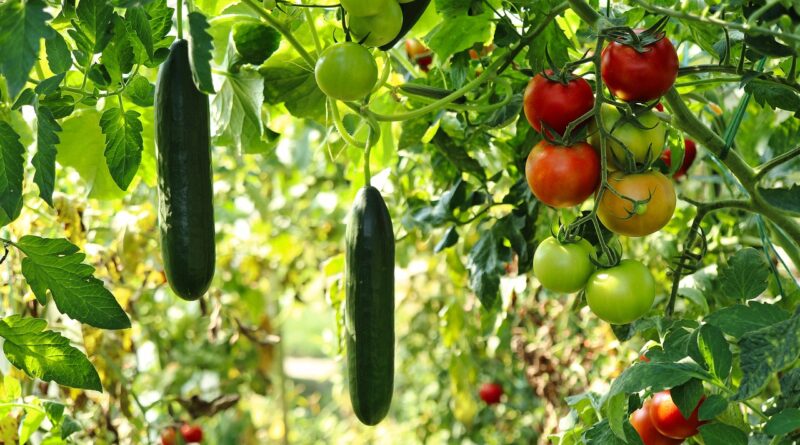Benefits of Organic Gardening for You and the Environment
Organic products are expensive compared to non-organic products, but their benefits outweigh their cost. Organic products are brought freshly from the farm directly to the market and are safe for humans, animals, and the environment.
In organic gardening, you only use animals, plants, and mineral components without any chemical additions. This ensures your health is in check, you have a better lifestyle, and your environment is free from soil, water, and air pollution. Fresh vegetables and fruits from your garden have a short shelf life, so they are consumed while their nutrients are active and intact.
Do you have a garden you are weighing to establish an organic garden?
This is a follow-up to our previous article on the numerous benefits of organic gardening for you and your environment.
Benefits of Organic Gardening to Humans
Organic crops from your garden contain nutritious and flavorful foods that are beneficial for your body, social life, finances, and general lifestyle.
1. Physical and Mental Health Benefits
An organic garden has fruits, herbs, and vegetables cultivated free of chemicals. These foods help reduce the risks of contaminating human and animal diseases. Healthy foods enhance your mental health, giving you horticultural benefits. While working in your organic garden, your mind relaxes, your stress levels are reduced, and you achieve a growth mindset.
While tending to your organic garden, you gain numerous physical benefits. Farming burns calories, strengthens your heart, enhances your hand muscle strength, and exposes you to the sun, which provides vitamin D.
Studies have shown that consistent use and exposure to inorganic components can pose serious health issues such as nervous system complications, reproductive system problems, and cancer. The pesticide particles were present in certain types of cancer patients.
2. Social Benefits
Organic gardens can be enhanced into a social and communal activity, such as a gardening club. In the club, members motivate each other to grow organic plants in their gardens to impact their health, surroundings, and community positively.
In addition, the members of the organic gardening club gather to learn, cook organic meals, and eat and grow more organic foods, which creates an impactful change in their lives.
3. Financial Benefits
One of the most prominent theories about organic gardening is the high cost involved compared to the parallel inorganic products on the market. In the long run, the high cost of maintaining an organic garden can be leveraged, making the products cost-effective.
The organic garden uses decomposed organic materials, such as fertilizer, and recycled materials from your kitchen and lawn. The composition is free of pests and diseases and easy to access, reducing the costs incurred in procuring inorganic fertilizers and pesticides.
Organic gardening improves garden soil health, facilitating better, natural, nutrient-filled plants for your family to consume. This saves you money on grocery shopping and medicines bought due to contaminated food consumption.
4. Nutritional and Flavor Benefits
Organically cultivated foods contain more minerals and vitamins than conventional crops. This ensures that your food retains its original flavor and nutrients.
According to research, organic foods contain 21 nutrients at higher levels than similar inorganic foods. Organic foods contain:
- A plus of 28% of magnesium.
- A plus of 26% of vitamin C.
- A plus of 20% of iron.
- A plus of 14% of phosphorus.
5. Better Lifestyle Benefits
Organic gardening encourages you to embrace a better lifestyle. Although labor-intensive, it can help you lose weight, release stress, and amass extra energy.
The garden also enhances your compound outlook as it becomes greener and livelier. This encourages birds, bees, and other pollinating animals in your environment. The serene sight and the fresh air from your green garden are a total lifestyle changer.
Benefits of Organic Gardening to the Environment
Organic farming involves using homemade components to enhance the growth of organic seeds. The lawn from your garden, food remains, and peels make excellent manure for your garden.
Pests and diseases are also controlled organically using homemade non-chemical formulas such as ash and other scented plants. Some of the benefits of organic gardening to the environment include:
1. Healthy Soil
In organic farming, naturally preserved fertilizer (composite manure) containing essential bacteria is used. Chemical fertilizers and pesticides that harm the soil are prohibited. The soil is healthy and free of any chemical composition.
A healthy soil yields healthy crops that are nutritious and beneficial to the body. After the harvest, the residual organic plants decompose in the soil, adding more nutrients.
2. Reduced Erosion
Organic farming results in healthy soil with solid bonds, hence eradicating erosion. The organic garden limits the number of land tillage, which helps the soil stabilize so it can be eroded quickly.
Using chemical fertilizer hurts the soil. The soil dies up and becomes compact, making it susceptible to erosion. The erosion removes the rich soil that grows nutritious crops, leaving the land bearable and reducing food security.
3. Contribute to the Provision of Clean Water
Clean water is vital for human and animal health and crop growth. Depletion of clean water affects human and animal survival and plant growth.
Organic farming involves mulching, which helps prevent the soil from being washed away, conserving the environment. Water used in irrigating organic gardens is clean and safe, posing no damage to the soil or the environment. Unlike inorganic farming, overflowing water uses non-hazardous chemicals, keeping the water supply clean and safe.
Non-organic farming methods use harmful chemicals, which can lead to water contamination. The water drains from the chemical-filled soil to streams and rivers, which are full of chemicals, posing a considerable danger to the environment.
4. Contribute Positively to Climate Change
Organic gardening slows climate change through reductions in carbon emissions. It also utilizes organic material in the environment by recycling it.
Organic farming has multiple emissions from greenhouse gases, such as fertilizers, pesticides, herbicides, and fossil-fueled machinery working on the farm. The emissions interfere with the ozone layer, which leads to climate change that has adverse effects on our environment, such as extreme droughts and floods.
5. Helps Eradicate Algae Blooms
Algae blooms are caused by washed-away water from fields containing fertilizers and chemicals. The algae can grow beyond control, affecting humans, animals, and the environment.
Areas with overgrown algae cannot contain functional food components. In lakes, algae affect marine life every day. These have substantial negative impacts on the food basket and the economy, as crop production is reduced in the affected areas, and those who depend on marine life for survival cannot work in algae-infested areas.
6. Stimulates Biodiversity
In organic farming, farmers embrace biodiversity, stabilizing the farm and keeping off invader species. The composition of the composite manure, which consists of animal waste, plant waste, and microorganisms, enhances soil health.
Healthy soil is tough enough to withstand diseases and erosion. In the long run, using chemical fertilizers, herbicides, and pesticides is useless because the soil can self-sustain.
7. Restoration of the ecological System
Organic soil has high water-retentive power, reducing soil erosion. Plants grow organically without chemicals that cause soil poisoning, water pollution, air pollution, and the death of pollinating insects and birds.
Healthy soil can restore the natural ecological system for plants, animals, and humans, resulting in a habitable and healthy environment.
8. Control Pest Naturally
In natural ecology, there are no pests. Pest is the human notion of labeling certain animals, insects, and invasive plants that hinder maximum productivity. Hence, pesticides are manufactured to have a lasting effect on humans, animals, crops, and the environment.
Organic gardening uses natural ways to control pests, such as crop rotation, planting cover crops, and composting methods. This contrasts with inorganic farming, which capitalizes on using chemicals, herbicides, and pesticides to control pests that leave lasting environmental side effects.
Research has shown that the pesticides and herbicides used in inorganic farming can stay in the atmosphere for 100 days. These statistics are a concern and should be an enlightening reason to embrace organic agriculture.
Takeaways
Organic gardening is beneficial to the soil, thus yielding healthy foods that are nutritious to the body and do not expose consumers to diseases. Organic farming ensures that pesticides, herbicides, and inorganic fertilizers are not used, which is dangerous to the environment.
Through organic farming, the farm can maintain topsoil and prevent:
- Soil contamination
- Soil erosion
- Water Pollution
- Toxic Runoff
- Soil Poisoning
- Restore Soil Organism
- Death of birds, insects, and critters
Through organic farming, plants and animals can access clean, adequate water and air that stimulate their natural growth. The gardens produce crops with natural flavors, high vitamins, and mineral compositions.
Embrace organic gardening for safe food and the environment, and minimize the effects, such as floods and droughts.

Emily Suleiman is a stay-at-home mom and avid gardener who shares expertise in transforming spaces into vibrant havens through practical tips and creative insights.




